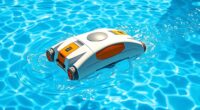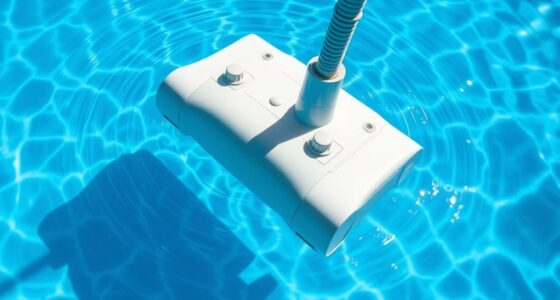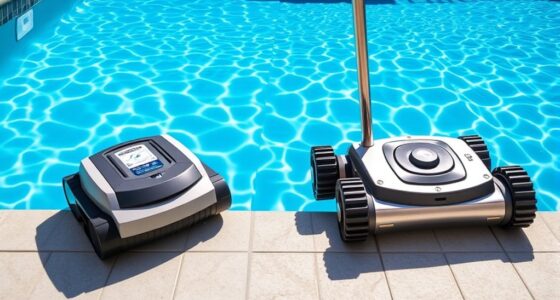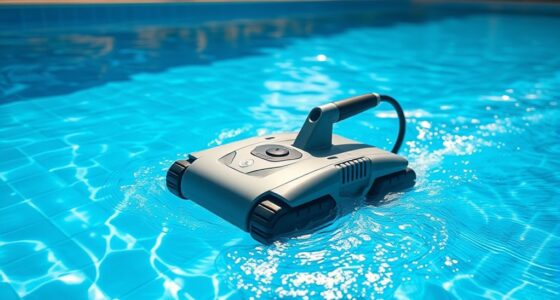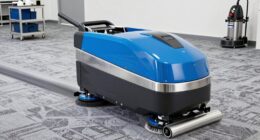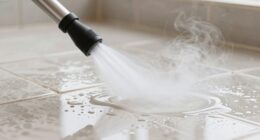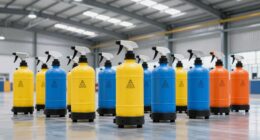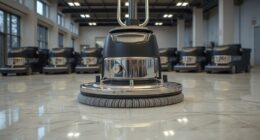Pressure pool cleaners are still relevant, especially for large, debris-filled pools. They connect to your pool’s return jet and use water pressure to move along the floor and walls, efficiently picking up dirt and leaves. While they’re easy to install and operate independently of your filtration system, they may struggle with tight corners or complex shapes. To discover how to choose the best cleaner for your pool, keep exploring the options available.
Key Takeaways
- Pressure pool cleaners are effective for large debris and targeted cleaning, especially in pools with complex shapes.
- They operate independently of the pool’s filtration system, offering reliable cleaning without relying on suction.
- Advances in technology have improved their maneuverability, making them more adaptable to various pool layouts.
- Modern robotic and suction-side cleaners now offer more comprehensive cleaning, but pressure cleaners remain cost-effective and easy to maintain.
- Their relevance depends on pool size, debris type, and user preference, making them still a viable option for many pool owners.
How Pressure Pool Cleaners Operate
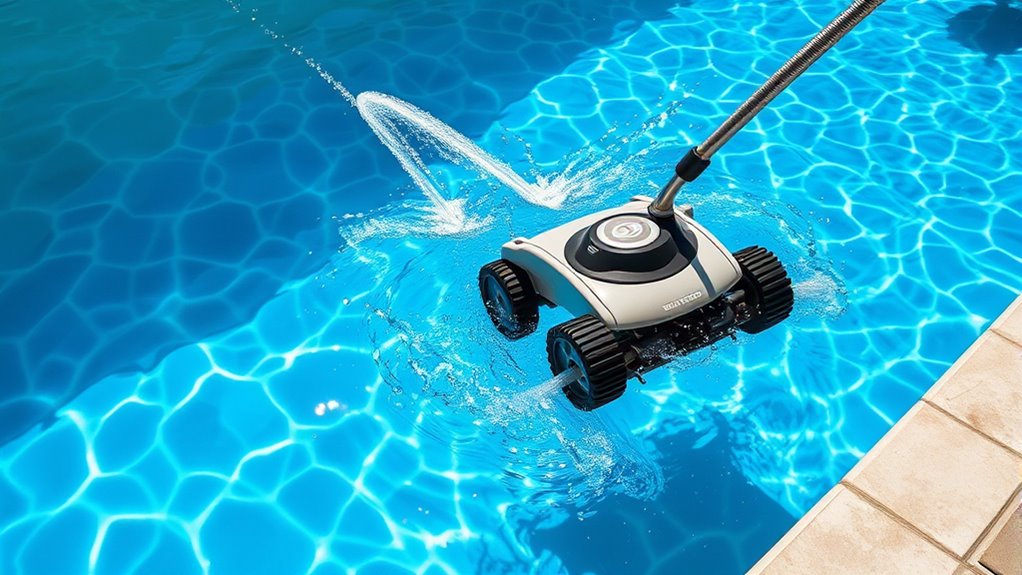
Have you ever wondered how pressure pool cleaners effectively keep your pool spotless? These devices operate by harnessing the power of water circulation. They connect to your pool’s return jet, using pressure to move along the pool floor and walls. As they traverse the surface, they pick up debris like leaves, dirt, and bugs. The cleaner’s internal system then filters this debris from the water, helping maintain clarity. The continuous water flow ensures the cleaner stays in motion, covering the entire pool area efficiently. By relying on water circulation to drive movement and debris filtration to trap unwanted particles, pressure pool cleaners keep your pool clean without manual scrubbing. Proper maintenance, such as regular filter cleaning, can prevent clogs and ensure optimal performance. Additionally, understanding the water flow dynamics can help optimize cleaning efficiency, making your pool maintenance even easier. Regularly checking the pressure levels in your system can also maximize cleaning effectiveness, ensuring thorough coverage. Leveraging advanced automation can further improve pool cleaning routines and reduce manual effort. Recognizing the benefits of pressure pool cleaners can help you decide if they are the right choice for your pool maintenance routine. This seamless process makes them a popular choice for effortless pool maintenance.
Advantages of Using Pressure Pool Cleaners
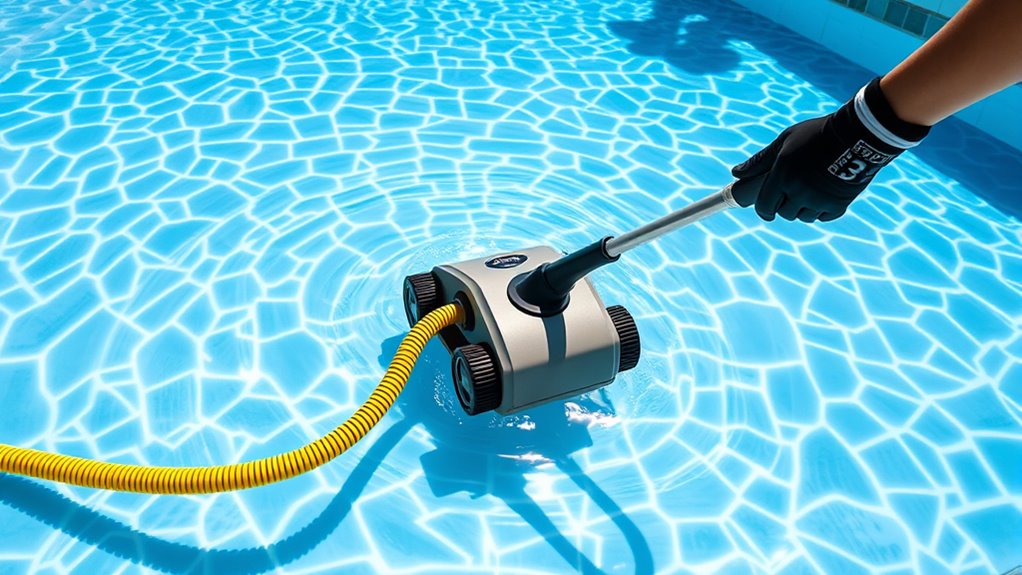
Pressure pool cleaners offer several advantages that make them a popular choice for pool owners. One key benefit is their manual operation, allowing you to control cleaning frequency and coverage easily. They effectively target stubborn dirt and debris, reducing the need for frequent manual skimming. Additionally, pressure cleaners help maintain proper chemical balance by removing debris that can affect water chemistry. Their powerful suction ensures thorough cleaning, especially in hard-to-reach areas. Unlike some other cleaners, they operate independently of your pool’s filtration system, saving energy and reducing wear. Plus, they’re generally easy to install and maintain, giving you a reliable tool to keep your pool sparkling. Proper pressure pool cleaner maintenance can further enhance their effectiveness and lifespan. Regular inspection of the hose and filter components ensures optimal performance and prevents clogs. Incorporating innovative cleaning techniques can also improve efficiency and extend the life of your equipment. Overall, pressure pool cleaners combine efficiency and convenience, making pool maintenance less of a chore.
Limitations and Drawbacks
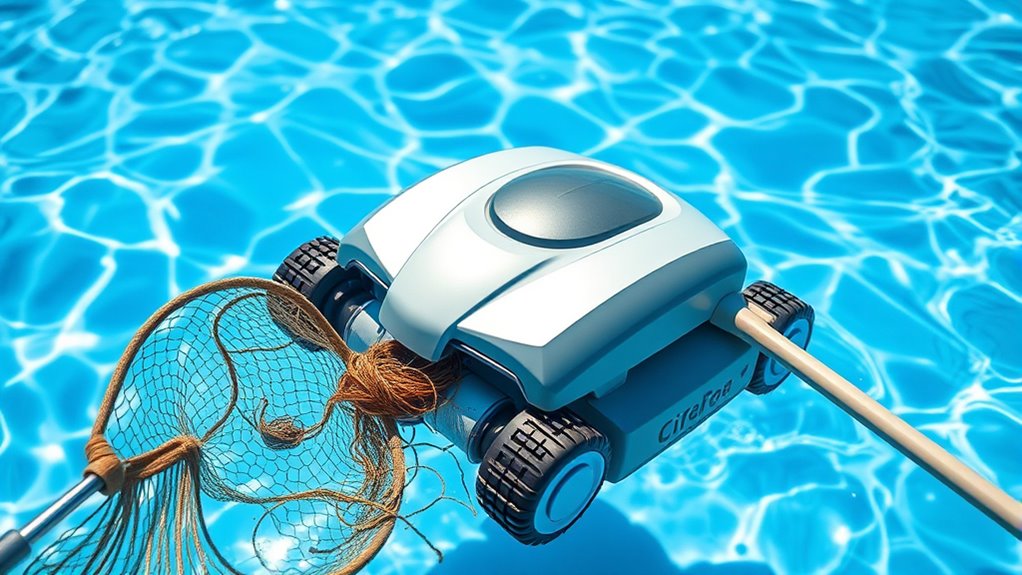
While pressure pool cleaners are effective in removing debris, they do have some limitations that can affect their overall performance. One key issue is manual limitations—you need to regularly set up and position the hoses and ensure proper connection to the pool’s filtration system. This process can be time-consuming and requires some effort, especially if you’re unfamiliar with the equipment. Additionally, pressure cleaners are highly power dependent; if your pool’s water pressure drops or the pump isn’t strong enough, cleaning efficiency declines. They also tend to struggle with tight corners or intricate pool shapes, leaving some debris behind. Overall, these drawbacks mean you might spend more time troubleshooting or supplementing cleaning with other methods, which can reduce the convenience pressure cleaners are supposed to offer. Furthermore, the effectiveness of pressure cleaners can be impacted by suction power and filtration systems, which are critical for optimal performance. Recognizing the home improvement aspects of pool maintenance can help in choosing the right cleaning tools for your needs. Properly maintaining your pool equipment and ensuring consistent pressure levels can significantly enhance cleaning results and minimize operational issues. Additionally, investing in professional advice can help optimize your cleaning routine and equipment setup.
Comparing Pressure Cleaners to Robotic and Suction-Side Models
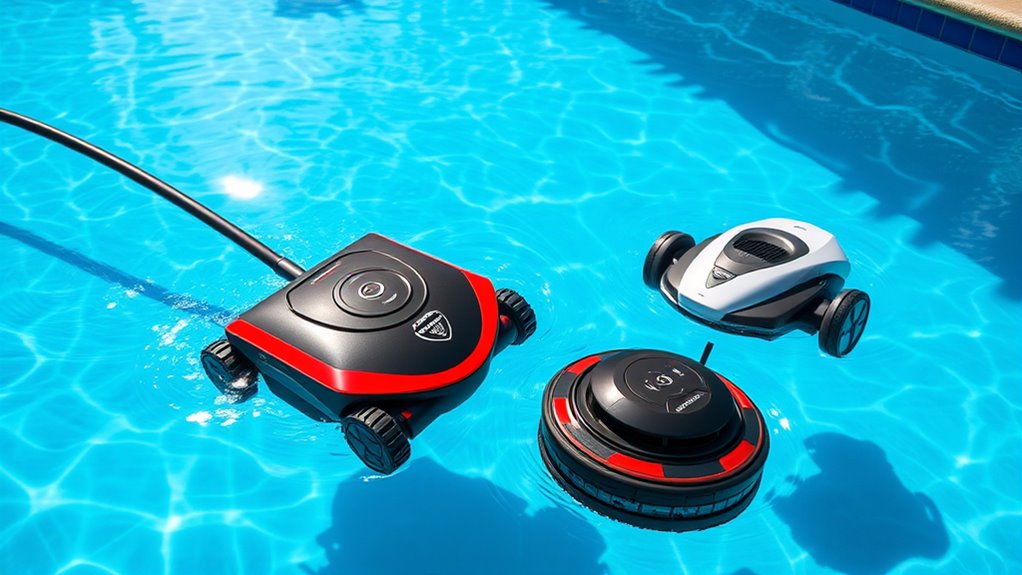
When choosing a pool cleaning system, understanding how pressure cleaners compare to robotic and suction-side models can help you make an informed decision. Pressure cleaners use the pool’s existing pump and pressure side, making them effective for large debris but less precise for detailed cleaning. Robotic models operate independently, maneuvering the pool and cleaning thoroughly, often with built-in filters and advanced features. Suction-side cleaners connect to your skimmer or dedicated vacuum line, offering a balance between cost and efficiency. For seasonal maintenance, robotic cleaners reduce effort and provide thorough cleaning, saving you time. Incorporating the right pool accessories, like brushes and filters, enhances each system’s performance. Additionally, considering maintenance requirements can help determine which system is most suitable for your pool’s needs. Proper system compatibility with your pool setup can also influence ease of use and effectiveness. Ultimately, your choice depends on pool size, debris type, and maintenance frequency preferences.
Cost and Maintenance Considerations
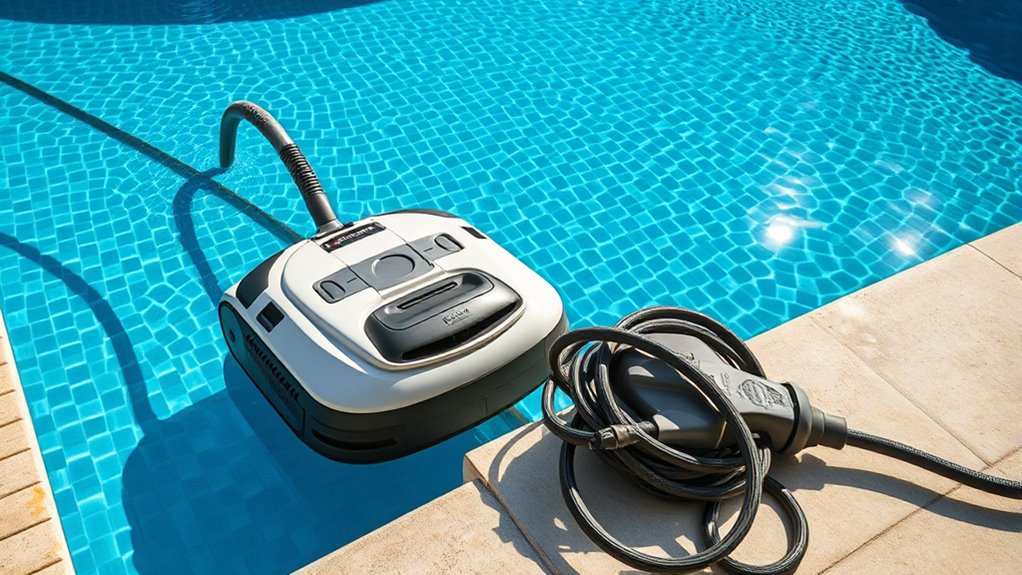
Cost and maintenance are key factors to contemplate when choosing a pool cleaner, as each type varies considerably in both upfront expenses and ongoing upkeep. Pressure pool cleaners can be budget-friendly initially, but long-term costs might add up due to parts replacement and higher energy use. If you have budget constraints, it’s important to weigh these ongoing expenses carefully. Additionally, some models may require more frequent part replacements, which can influence overall costs over time. While pressure cleaners are generally durable, they require periodic maintenance to stay effective. Regularly monitoring energy efficiency can help reduce operational costs and extend the lifespan of your cleaner. Staying informed about technological advancements can also enhance your ability to select a more efficient and cost-effective model, ultimately saving you money. For example, newer models may incorporate smart technology that optimizes cleaning cycles and conserves energy, further reducing costs. Moreover, understanding the cost benefits of different cleaning technologies can assist in making a well-informed decision. Considering these costs ensures you select a cleaner that fits your budget constraints and minimizes long-term spending.
Technological Advances and New Features
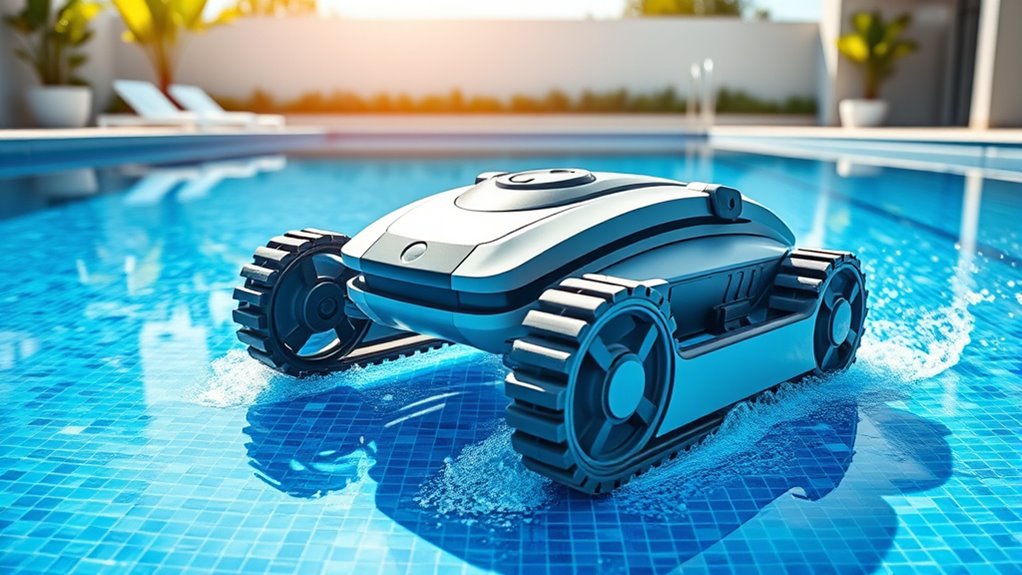
Modern pressure pool cleaners now feature smart cleaning technologies that adapt to your pool’s shape and dirt levels. You’ll also notice enhanced maneuverability, allowing the cleaner to reach tricky spots effortlessly. These advances make maintenance more efficient and keep your pool cleaner for longer. Additionally, incorporating efficient heating solutions can help extend the usability of your pool during colder months, ensuring a comfortable swimming environment year-round. As the industry evolves, regulatory clarity and technological innovations continue to shape the future of pool maintenance tools. Moreover, ongoing research into environmentally friendly materials supports sustainable practices in manufacturing and disposal. Embracing these innovations encourages a more creative approach to pool maintenance, leading to smarter solutions and better resource management.
Smart Cleaning Technologies
Advances in smart cleaning technologies have revolutionized how pressure pool cleaners operate, making them more efficient and user-friendly. These innovations reduce your need for manual operation, allowing the cleaner to adapt to your pool’s specific needs automatically. Features like sensors and intelligent programming help maintain proper chemical balancing, ensuring cleaner water and healthier pool conditions. Some cleaners now include remote control or app connectivity, giving you real-time updates and control from anywhere. This minimizes your involvement and streamlines maintenance. Additionally, AI-driven solutions are increasingly integrated into pool cleaning systems, further enhancing their adaptability and effectiveness. These developments highlight the continued relevance of pressure pool cleaners in modern pool maintenance routines.
Enhanced Maneuverability Features
Recent innovations in smart cleaning technologies have paved the way for enhanced maneuverability features that make pressure pool cleaners more agile and effective. These advancements help you tackle navigation complexity with greater ease, allowing the cleaner to adapt seamlessly to your pool’s layout. Advanced obstacle avoidance systems enable the cleaner to detect and navigate around objects, preventing collisions and missed spots. This means fewer manual interventions and a more thorough clean. Enhanced maneuverability ensures your pressure cleaner can reach tricky corners and tight spaces, maximizing its cleaning efficiency. With these new features, you gain a device that moves smarter, not just harder, making pool maintenance simpler and more reliable. Overall, these technological improvements keep pressure pool cleaners competitive by addressing key challenges like navigation complexity and obstacle avoidance.
Suitability for Different Pool Types and Sizes
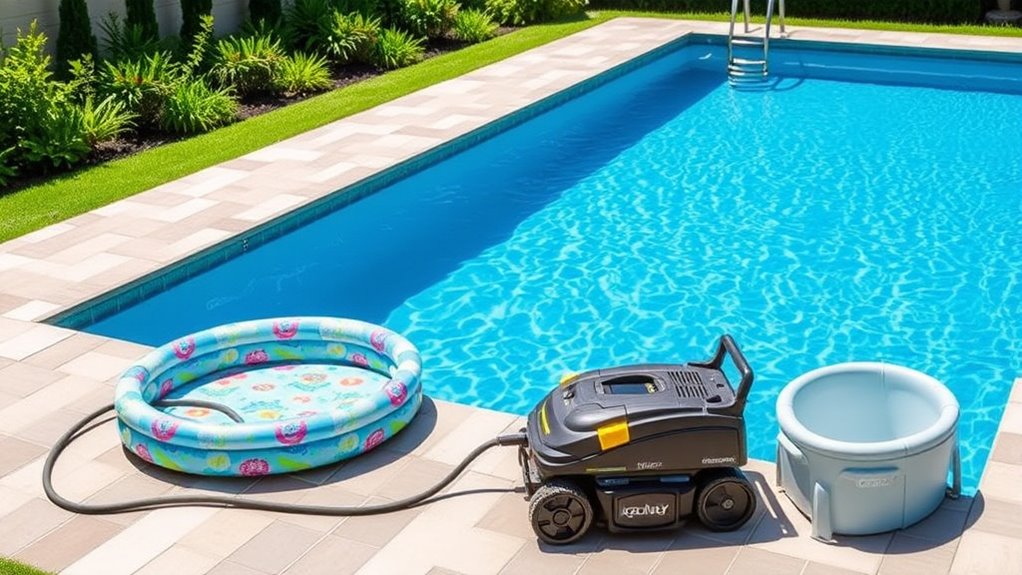
Not all pressure pool cleaners work well with every pool shape or size, so it’s important to choose one that fits your needs. Some models are more effective in large or irregularly shaped pools, while others excel on specific surfaces. Considering your pool’s dimensions and surface type helps guarantee you select a cleaner that performs efficiently.
Compatibility With Pool Shapes
Pressure pool cleaners are designed to work effectively across a variety of pool shapes and sizes, but their compatibility can vary depending on specific features. Your pool’s shape impacts how well the cleaner performs, especially regarding pool shape compatibility and surface adaptability. Some cleaners excel with simple geometries, like rectangular or oval pools, while others may struggle with complex curves or irregular designs.
- Compatible with most standard shapes, including rectangles and ovals
- May require adjustments for irregular or freeform pools
- Surface adaptability ensures effective cleaning on tiles, vinyl, or plaster
Choosing a pressure cleaner with good pool shape compatibility and surface adaptability ensures thorough cleaning, regardless of your pool’s unique design or surface material.
Effectiveness in Various Sizes
Pressure pool cleaners vary in how well they handle different pool sizes, making it important to choose one suited to your specific needs. For larger pools, opt for models with strong suction power and higher energy efficiency to clean thoroughly without running up your energy bill. Smaller pools benefit from compact designs that offer quick, effective cleaning while saving user convenience. Some cleaners are adjustable, allowing you to customize the cleaning cycle according to your pool size, which enhances efficiency and saves time. Keep in mind that a cleaner suited for your pool’s size ensures peak performance, reduces energy consumption, and offers greater user convenience. Selecting the right pressure pool cleaner for your pool size guarantees a cleaner, more enjoyable swimming environment.
Suitable for Different Surfaces
Choosing a pressure pool cleaner that suits your pool’s surface guarantees ideal cleaning performance and longevity. Different surfaces, like vinyl, fiberglass, or concrete, require specific attention to avoid surface damage. Ensure the cleaner is compatible with your pool’s material to prevent scratches or erosion. Also, check chemical compatibility; some cleaners may react poorly with certain pool chemicals, causing deterioration or staining.
- Use a model designed for delicate surfaces like vinyl or fiberglass to prevent damage.
- Confirm the cleaner’s chemical compatibility to avoid surface discoloration.
- Opt for adjustable pressure settings to accommodate various pool sizes and surface types.
Matching the cleaner to your pool’s surface ensures effective cleaning without risking damage, extending your pool’s lifespan.
Making an Informed Choice for Your Pool Maintenance
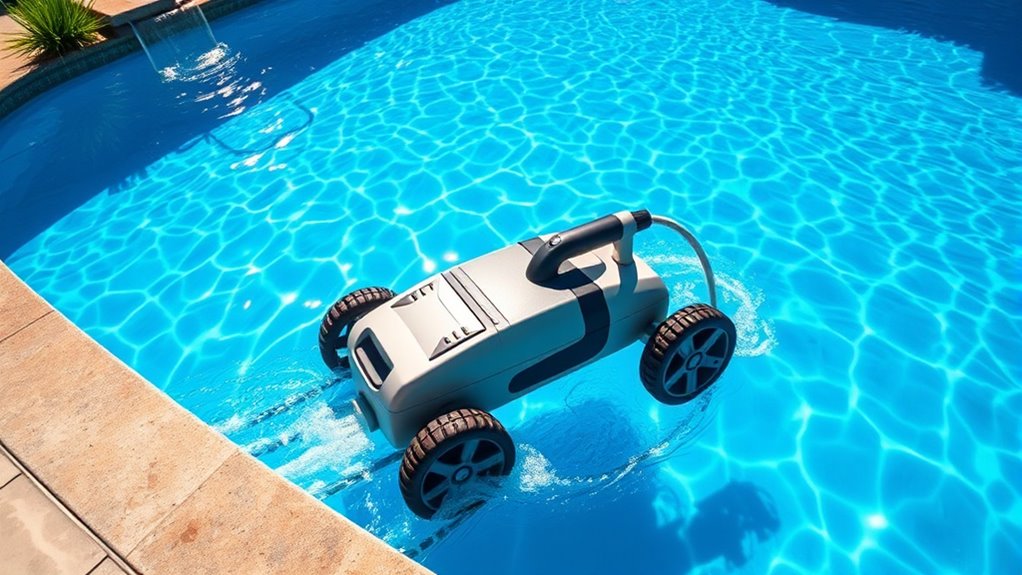
Making an informed choice about your pool maintenance options guarantees you select the equipment that best fits your needs and budget. Consider how your pool’s size and surface influence your decision. For example, a pressure pool cleaner might require less manual effort, but you’ll also need to manage pool chemicals to keep the water clear and balanced. Additionally, investing in a good pool cover can reduce debris buildup, making cleaning easier and less frequent. Think about your maintenance routine—do you prefer quick, automated solutions or manual cleaning? By understanding these factors, you can choose equipment that minimizes costs and effort while maintaining a safe, inviting pool. Being informed helps ensure your pool stays pristine without unnecessary expenses or hassle.
Frequently Asked Questions
How Long Do Pressure Pool Cleaners Typically Last?
Pressure pool cleaners usually last around 3 to 5 years, depending on usage and maintenance. Unlike manual operation, these devices efficiently cover large pool areas and handle debris better. As alternative devices like robotic cleaners become popular, pressure cleaners remain a reliable choice if maintained properly. You should regularly check for wear and tear to extend their lifespan, ensuring they keep your pool clean without frequent replacements.
Are Pressure Pool Cleaners Energy-Efficient Compared to Other Types?
Picture the powerful, pulsating pace of pressure pool cleaners. You’ll find they’re pretty practical, especially when comparing energy efficiency. While solar-powered options save some energy, manual operation models tend to use less power overall. You have the power to pick what’s best for your budget and eco-friendly goals. So, yes, pressure pool cleaners can be energy-efficient, especially when you choose low-energy, manual-operation models that minimize energy consumption while maintaining a pristine pool.
Can Pressure Pool Cleaners Handle Heavy Algae Buildup?
You’ll find that pressure pool cleaners can handle heavy algae buildup quite effectively, especially when combined with proper use of algae treatments. They use strong jets to dislodge debris, but if algae is thick, clogged filters may reduce their efficiency. Regularly cleaning or replacing filters guarantees peak performance. So, pressure cleaners are a good choice, but maintaining filters is key to tackling stubborn algae and keeping your pool crystal clear.
What Are Common Troubleshooting Issues With Pressure Pool Cleaners?
Think of troubleshooting your pressure pool cleaner as tending a garden—each issue is a weed to be carefully uprooted. Common problems include blockages, worn-out hoses, or low water flow, which often require manual operation to diagnose. Make certain your chemicals are balanced; imbalanced water can hamper cleaning. Regular maintenance keeps your cleaner running smoothly, preventing minor hiccups from turning into bigger problems and ensuring your pool stays crystal clear.
Are There Eco-Friendly Pressure Pool Cleaner Options Available?
You’ll find eco-friendly options for pressure pool cleaners that reduce energy use and chemical runoff, making your pool maintenance more sustainable. These cleaners often incorporate energy-efficient motors and biodegradable materials. If you prefer a manual alternative, you can also opt for manual skimmers and brushes, which require no power and are completely eco-friendly. Both options help you keep your pool clean while minimizing environmental impact, giving you more sustainable choices.
Conclusion
Ultimately, pressure pool cleaners provide a practical, powerful, and dependable solution for pool maintenance. They deliver diligent dirt removal, demonstrating durability and dependability. While they may face some flaws, their steadfast service still shines. If you’re seeking a steady, straightforward system that sweeps and scrubs with strength and simplicity, pressure cleaners could still be your pool’s best buddy—bringing bright, beautiful, and pristine water to your backyard oasis.


